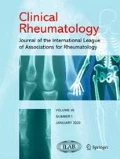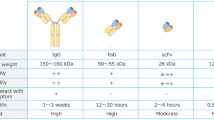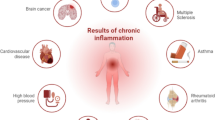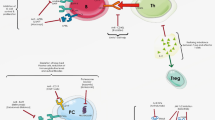Abstract
Insulin resistance, a key feature of type 2 diabetes, is an independent risk factor for developing cardiovascular diseases (CVD), and represents the core of metabolic syndrome (MetS). Actually, an intriguing correlation between MetS and inflammation associated with rheumatoid arthritis (RA) is largely accepted but not yet completely clarified in detail. Recently, the therapeutic arsenal against RA has been enriched of abatacept, a fusion protein (CTLA4 immunoglobulin) designed to modulate the T cell co-stimulatory signal mediated through the CD28–CD80/86 pathway. Here, we report a case of dramatic improvement in insulin resistance, estimated with the surrogate measure HOMA-IR, after treatment with abatacept. Lastly, we shortly review the preclinical evidences supporting a possible role of T lymphocytes in rheumatoid arthritis-associated insulin resistance and how abatacept could improve glucose metabolism by suppressing adipose tissue infiltrating cells.
Similar content being viewed by others
References
John H, Toms TE, Kitas GD (2011) Rheumatoid arthritis: is it a coronary heart disease equivalent? Curr Opin Cardiol 26(4):327–333
Reaven GM (1988) Banting lecture 1988. Role of insulin resistance in human disease. Diabetes 37(12):1595–1607
Ursini F, Naty S, Grembiale RD (2010) Infliximab and insulin resistance. Autoimmun Rev 9(8):536–539
Matthews DR et al (1985) Homeostasis model assessment: insulin resistance and beta-cell function from fasting plasma glucose and insulin concentrations in man. Diabetologia 28(7):412–419
Nishimura S et al (2009) CD8+ effector T cells contribute to macrophage recruitment and adipose tissue inflammation in obesity. Nat Med 15(8):914–920
Derdemezis CS et al (2011) Obesity, adipose tissue and rheumatoid arthritis: coincidence or more complex relationship? Clin Exp Rheumatol 29(4):712–727
Kintscher U et al (2008) T-lymphocyte infiltration in visceral adipose tissue: a primary event in adipose tissue inflammation and the development of obesity-mediated insulin resistance. Arterioscler Thromb Vasc Biol 28(7):1304–1310
Winer S et al (2009) Normalization of obesity-associated insulin resistance through immunotherapy. Nat Med 15(8):921–929
Feuerer M et al (2009) Lean, but not obese, fat is enriched for a unique population of regulatory T cells that affect metabolic parameters. Nat Med 15(8):930–939
Poggi M et al (2009) The inflammatory receptor CD40 is expressed on human adipocytes: contribution to crosstalk between lymphocytes and adipocytes. Diabetologia 52(6):1152–1163
Disclosures
None.
Author information
Authors and Affiliations
Corresponding author
Additional information
Key message
Abatacept could be able to improve metabolic status in insulin-resistant patients.
Rights and permissions
About this article
Cite this article
Ursini, F., Mauro, D., Naty, S. et al. Improvement in insulin resistance after short-term treatment with abatacept: case report and short review. Clin Rheumatol 31, 1401–1402 (2012). https://doi.org/10.1007/s10067-012-2034-0
Received:
Accepted:
Published:
Issue Date:
DOI: https://doi.org/10.1007/s10067-012-2034-0




